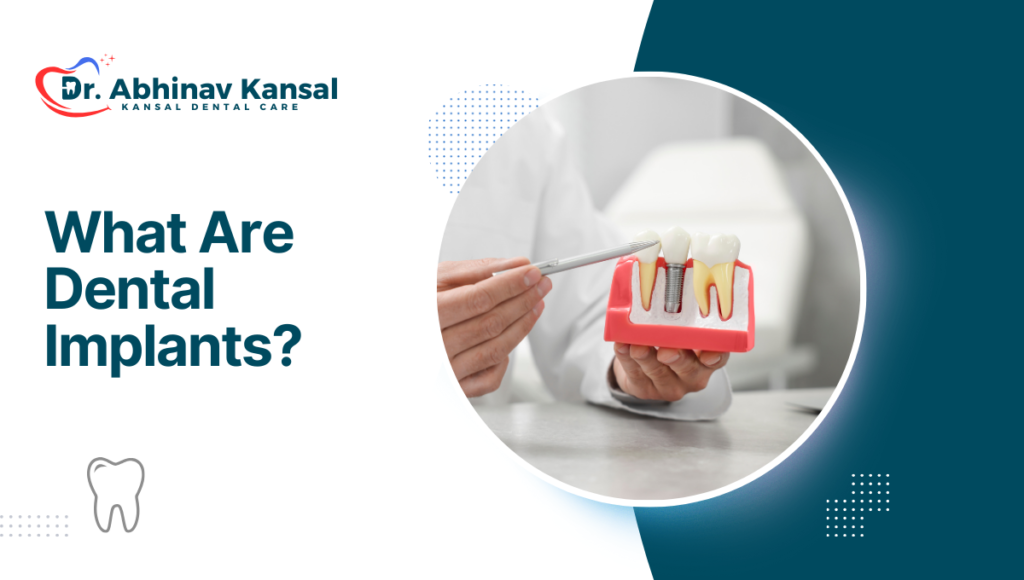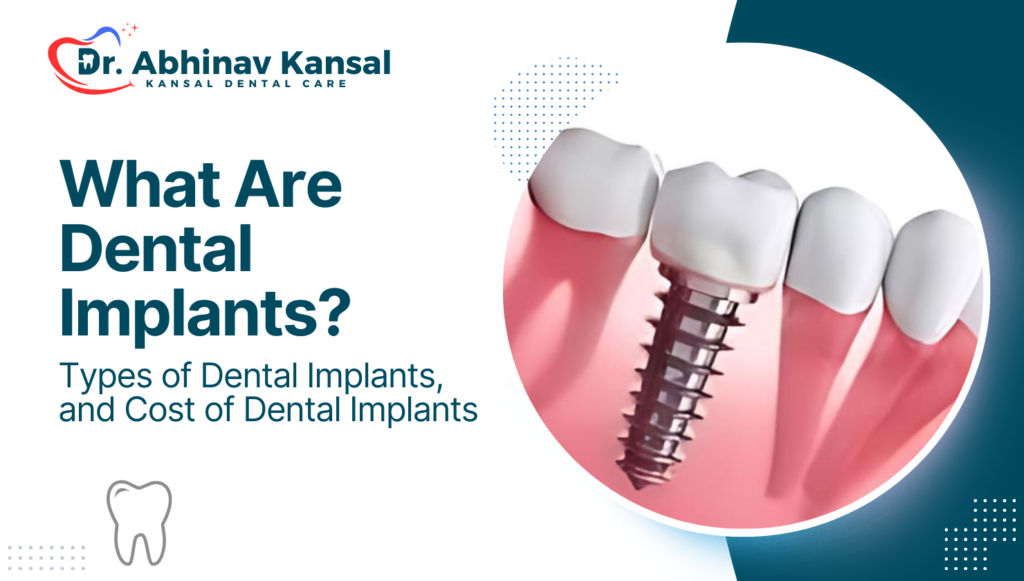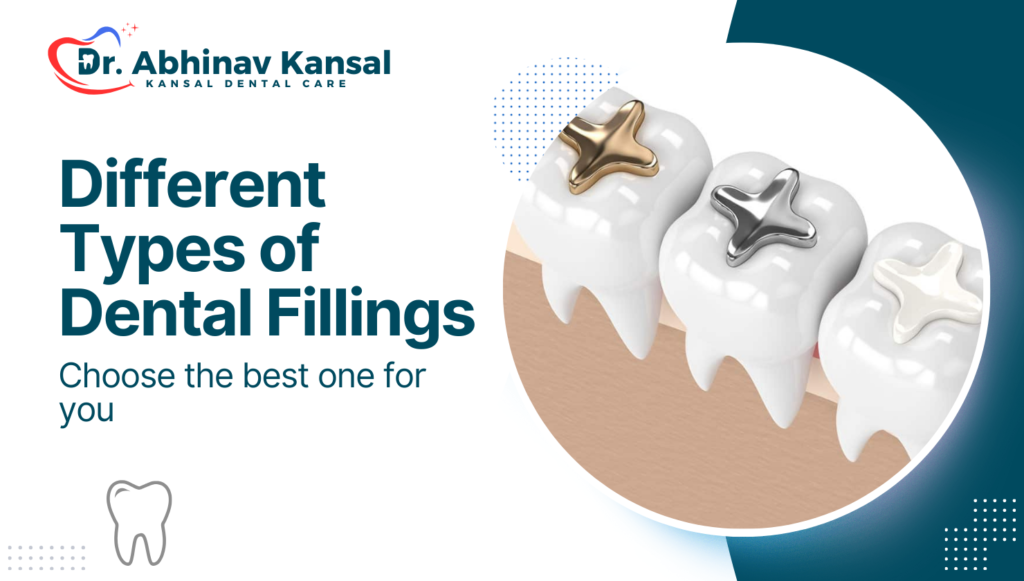What Are Dental Implants? A Complete Guide

What Are Dental Implants? A Complete Guide The Ultimate Guide to Smile Makeovers for Teens 5 Signs You Need to Visit a Dentist in Meerut Immediately Top Dental Care Tips for Families in Meerut Gum Disease: Causes, Symptoms, and Treatment What Are Dental Implants? Types of Dental Implants, and Cost of Dental Implants Load More What Are Dental Implants? A Complete Guide Introduction Dental implants are a permanent solution to missing teeth, providing a natural-looking and fully functional replacement. At Kansal Dental Care, we specialize in delivering high-quality dental implant treatments that restore your smile and boost your oral health. Types of Dental Implants There are different types of dental implants, and choosing the right one depends on your specific dental needs: Endosteal Implants: The most common type, these implants are surgically placed directly into the jawbone. Subperiosteal Implants: Placed under the gum but above the jawbone, this option is suitable for those with insufficient bone density. Zygomatic Implants: These are placed in the cheekbone rather than the jawbone and are ideal for patients who have severe bone loss. Dental Implant Cost The cost of dental implants can vary based on several factors, such as: Number of Implants: Whether you need a single implant or multiple implants. Procedure Complexity: More complex cases may require additional procedures like bone grafting. Clinic Location: Dental care costs may vary based on geographic location. At Kansal Dental Care, we offer affordable dental implant options in Meerut. We encourage patients to contact us for a customized cost estimate based on their specific needs. Why Choose Dental Implants? Dental implants offer several advantages over other tooth replacement options: Natural Look and Feel: Dental implants mimic the appearance and function of natural teeth. Bone Health: Implants help maintain the structure of your jawbone, preventing bone loss. Longevity: With proper care, implants can last a lifetime. Improved Confidence: Dental implants restore not only your smile but also your confidence. Dental Implants vs. Dentures Dental Implants Permanent and fixed. Preserve jawbone health. Look and feel natural. Dentures Removable and may slip. Can cause bone loss over time. Require regular adjustments. While dentures may be a more affordable option initially, dental implants offer a long-term solution that’s more comfortable and natural. Advantages of Dental Implants Durability: Implants can last a lifetime with proper oral hygiene. Comfort: Unlike removable dentures, implants become part of your mouth. Oral Health: They don’t affect the surrounding teeth and help maintain a healthy mouth. Improved Functionality: Implants allow you to chew and speak more naturally. Dental Implant Procedure The process for getting dental implants involves several steps: Consultation: A thorough exam and X-rays to assess your oral health. Implant Surgery: The implant is surgically placed into the jawbone. Healing Phase: Over several months, the implant fuses with the bone (osseointegration). Crown Placement: After healing, a crown is attached to the implant, completing the restoration. Post-Operative Instructions Following your dental implant surgery, you should: Avoid hard foods for the first few days. Take prescribed medications to manage pain. Use an ice pack to reduce swelling. Rinse your mouth with salt water to prevent infection. Post-Implant Care To ensure the longevity of your dental implants: Brush and floss regularly to maintain oral hygiene. Avoid smoking as it can impair healing. Schedule routine dental checkups at Kansal Dental Care. Dental Implants FAQ Q: How long do dental implants last?A: With proper care, dental implants can last a lifetime.Q: Is the procedure painful?A: The procedure is performed under local anesthesia, making it pain-free. Some mild discomfort may be experienced after the surgery.Q: Can anyone get dental implants?A: Most healthy adults are good candidates for dental implants. However, those with severe bone loss may need additional procedures like bone grafting. Why We Are the Best Dental Implant Clinic in Meerut At Kansal Dental Care, we offer unmatched expertise in dental implant procedures. Dr. Abhinav Kansal has years of experience and uses state-of-the-art technology to ensure each patient receives the best care possible. Our clinic is renowned for: Advanced Technology: We utilize the latest tools and techniques for accurate and efficient treatments. Affordable Pricing: Transparent pricing with no hidden costs. Patient-Centered Care: We tailor our treatments to each patient’s unique needs, ensuring a comfortable and successful experience.
What Are Dental Implants? Types of Dental Implants, and Cost of Dental Implants

Restorative Dentistry What Are Dental Implants? Types of Dental Implants, and Cost of Dental Implants Abhinav Kansal August 23, 2024 Dr. Abhinav Kansal We understand just how closely connected oral health is to your overall health. Open Profile Share: Dental implants are a popular solution for replacing missing teeth and restoring a natural-looking smile. But what exactly are dental implants, and what types are available? Additionally, how much should you expect to invest in them? At Kansal Dental Care, we provide comprehensive dental implant services to help you make an informed decision. What Are Dental Implants? Dental implants are artificial tooth roots placed into the jawbone to support replacement teeth or bridges. They are designed to look, feel, and function like natural teeth. The process involves placing a titanium post into the jawbone, which then integrates with the bone over time. Once healed, a crown is placed on top of the post to complete the restoration. Types of Dental Implants Endosteal Implants Endosteal implants are the most common type of dental implant. They are placed directly into the jawbone and typically used to replace single teeth or multiple teeth with bridges or dentures. They are made of titanium and are designed to integrate with the bone. Subperiosteal Implants Subperiosteal implants are placed under the gum but on or above the jawbone. They are used for patients who do not have enough healthy jawbone for endosteal implants. These implants are less common and usually reserved for special cases. Zygomatic Implants Zygomatic implants are longer implants anchored into the cheekbone (zygomatic bone) rather than the jawbone. They are used for patients with severe bone loss in the upper jaw who cannot receive traditional implants. Cost of Dental Implants he cost of dental implants can vary widely based on several factors, including the type of implant, the number of implants needed, and additional procedures such as bone grafts. On average, a single dental implant can cost between ₹30,000 to ₹45,000 and more. However, this cost can increase if additional treatments are required or if the implant is part of a more complex restoration. Why Choose Kansal Dental Care for Your Dental Implants? Expertise of Dr. Abhinav Kansal: Dr. Kansal has extensive experience in placing dental implants, ensuring precise and effective results. Advanced Technology: We use state-of-the-art technology to plan and place your implants, improving outcomes and reducing recovery time. Comprehensive Care: From initial consultation to final placement, we provide personalized care to meet your unique needs. Conclusion Dental implants offer a durable and natural-looking solution for missing teeth. If you’re considering implants, consult with Dr. Abhinav Kansal to explore your options and determine the best solution for your smile. Contact Kansal Dental Care today to schedule your consultation. FAQ’s How long do dental implants last? Dental implants are designed to last many years, often a lifetime, with proper care and maintenance. Is the dental implant procedure painful? The procedure is usually performed under local anesthesia, so you should not feel pain. You may experience some discomfort during recovery, which can be managed with pain relief medication. How long does it take to recover from a dental implant procedure? Recovery time can vary, but most patients can expect to return to normal activities within a few days. Full healing and integration of the implant with the bone can take several months. Share: Book a Consultation It’s easy and free!
Understanding the Different Types of Dental Fillings and Which One is Right for You

Restorative Dentistry Understanding the Different Types of Dental Fillings and Which One is Right for You Abhinav Kansal August 22, 2024 Dr. Abhinav Kansal We understand just how closely connected oral health is to your overall health. Open Profile Share: When it comes to dental health, cavities are a common issue that most people face. Therefore, dental fillings are a standard treatment to restore a tooth affected by decay. However, with so many types of dental fillings available, how do you know which one is right for you? At Kansal Dental Care, we offer a range of options tailored to meet your specific needs. What Are Dental Fillings? Dental fillings are materials used to fill cavities or repair cracked or broken teeth. They restore the tooth’s shape, function, and appearance. Moreover, the choice of filling material depends on various factors like the location of the cavity, patient preference, and budget. Types of Dental Fillings 1. Amalgam Fillings Description: Made from a mix of metals including silver, mercury, tin, and copper. Advantages: Durable, long-lasting, and cost-effective. Best For: Back teeth where the filling won’t be visible. Considerations: Although durable, the visible metallic color may be less aesthetically pleasing. 2. Composite Fillings Description: Made from a tooth-colored resin material. Advantages: Blends with the natural tooth color, making it ideal for visible teeth. Best For: Front teeth or areas where aesthetics are important. Considerations: While aesthetically pleasing, composite fillings may not last as long as amalgam fillings, particularly in larger cavities. 3. Ceramic Fillings Description: Made from porcelain, these fillings are also tooth-colored and more resistant to staining. Advantages: Highly aesthetic, durable, and resistant to wear. Best For: Patients seeking a natural-looking and durable option, especially for visible teeth. Considerations: Typically, ceramic fillings are more expensive than other types of fillings. 4. Gold Filling Description: Made from a gold alloy. Advantages: Extremely durable, long-lasting, and well-tolerated by gum tissues. Best For: Patients who prefer a premium, long-lasting material. Considerations: However, the higher cost and noticeable metallic color are factors to consider. 5. Glass Ionomer Fillings Description: Made from a mix of acrylic and a specific type of glass. Advantages: Releases fluoride, which can help protect the tooth from further decay. Best For: Children’s teeth or cavities below the gum line. Considerations: Though beneficial, glass ionomer fillings are less durable and typically used in non-load-bearing areas. How to Choose the Right Filling for You Choosing the right type of filling depends on various factors: Location of the Cavity: Different fillings work better in different areas of the mouth. Aesthetic Preferences: Some materials blend better with natural teeth than others. Budget: Some fillings are more expensive than others. Longevity Needs: Consider how long you want the filling to last. Why Choose Kansal Dental Care for Your Dental Fillings? Expertise of Dr. Abhinav Kansal: With extensive experience in restorative dentistry, Dr. Kansal ensures that each filling is performed with precision. Advanced Technology: Our clinic uses the latest technology to provide durable and aesthetically pleasing fillings. Patient-Centered Care: We take the time to discuss all your options and help you choose the best filling for your needs. Conclusion At Kansal Dental Care, we believe in providing personalized care to help you maintain a healthy smile. If you need a dental filling or want to learn more about your options, schedule a consultation with us today. FAQ’S Share: How long do dental fillings last? The lifespan of a filling depends on the material used, your oral hygiene, and the location of the filling. Amalgam fillings can last up to 15 years, while composite fillings may last 5-10 years. Is the filling procedure painful? The filling procedure is usually done under local anesthesia, so you should not feel any pain. However, you may experience some discomfort after the anesthesia wears off, but it typically subsides quickly. Can I replace my old fillings? Yes, old or damaged fillings can be replaced with newer, more advanced materials. Consult with Dr. Kansal to discuss your options. Book a Consultation It’s easy and free!
